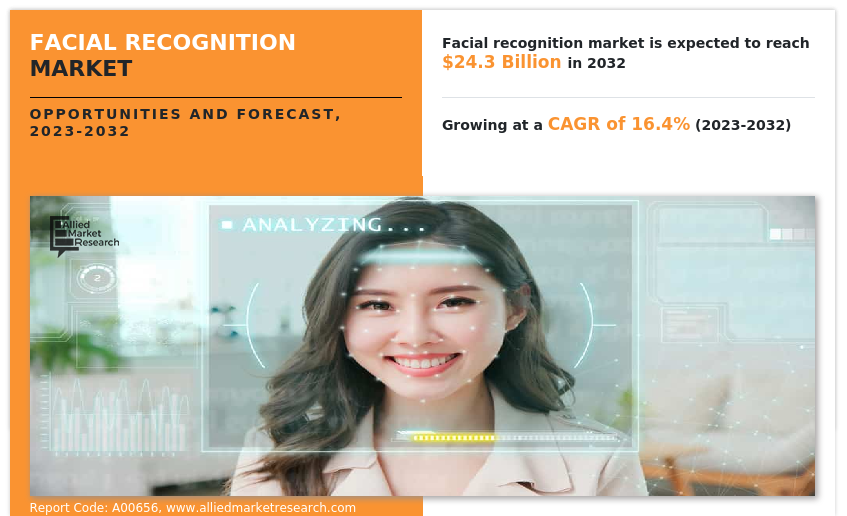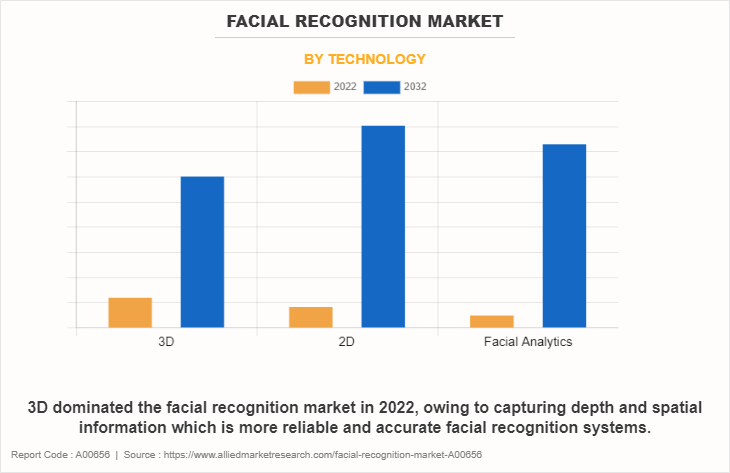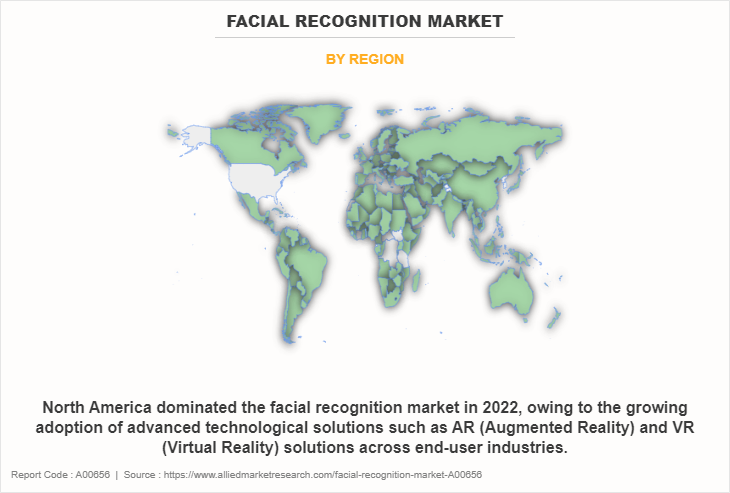Facial Recognition Market Size & Share:
The global facial recognition market size was valued at USD 5.5 billion in 2022 and is projected to reach USD 24.3 billion by 2032, growing at a CAGR of 16.4% from 2023 to 2032.
The facial recognition market is involved in the development and implementation of technologies that allow for the identification and verification of people based on their facial features. The goal of facial recognition technology is to generate a unique identifier for each person by analyzing and comparing distinctive facial characteristics, such as the distance between the eyes, the shape of the nose, and the jawline. The demand for convenient and safe authentication techniques in multiple sectors has led to a major increase in the market for facial recognition in the past few years. Applications for the technology can be found in fields like police enforcement, government, banking, retail, and healthcare.

Facial recognition is used in law enforcement for forensic investigation, criminal identification, and monitoring. It is used by governments for public safety, identification verification, and border control. Furthermore, facial recognition is also used in banking and retail for safe access management, fraud prevention, and customized consumer experiences. This technology is utilized in healthcare for patient identification, access management, and monitoring. Technological breakthroughs in artificial intelligence, deep learning algorithms, and computer vision are driving the facial recognition market. Additionally, the market is expanding as a result of the expanding availability of high-resolution cameras, the rising use of smartphones with facial recognition features, and the demand for contactless authentication techniques. However, obstacles to broad use of facial recognition and continued advancement include issues regarding privacy, data security, and potential biases in the algorithms employed for facial recognition.
Additionally, factors such as increasing need for effective video surveillance systems and rising government and military investments on facial recognition primarily drive the growth of the facial recognition market. However, concern over privacy and data security hampers market growth to some extent. Moreover, IoT and smart device adoption that works seamlessly is expected to provide lucrative opportunities for facial recognition market growth during the forecast period.

On the basis of technology, it is categorized into 3D, 2D, and facial analytics. As per application, it is divided into access control, attendance tracking and monitoring, emotion recognition, security and surveillance, and others. Depending on the end user, it is fragmented into retail and e-commerce, media and entertainment, BFSI, automobile and transportation, IT and Telecom, government, healthcare, and others. Region wise, it is analyzed across North America, Europe, Asia-Pacific, and LAMEA.
On the basis of technology, 3D segment dominated the facial recognition market share in 2022, owing to growing need for more reliable and accurate facial recognition systems across a number of industries, including security, banking, healthcare, and retail, is one of the main factors driving this expansion by capturing depth and spatial information. However, facial analytics segment is expected to be the fastest growing, owing to examine customer demographics, emotions, and engagement levels in-store using facial analytics technologies. This information can be utilized to target advertising and marketing campaigns, improve store layouts, and enhance consumer interactions.

Region-wise North America dominated the facial recognition market size in 2022, owing to the growing adoption of advanced technological solutions such as AR (Augmented Reality) and VR (Virtual Reality) solutions across end-user industries, such as media & entertainment, retail, and financial sectors, contributing toward a major trend in the North America region. However Asia-Pacific is expected to be the fastest growing region in the market, owing to the rise in the use of automated systems from unlocking mobile phones to checking in for flights to making payments with the use of AI to match live images of a person for verification against a database of photographs.
The global facial recognition industry is dominated by key players such as NEC Corporation, Aware, Inc., Cognitec Systems Gmbh., Thales, Fujitsu, Facephi, Nviso, Onfido, Daon, Inc., and Facefirst. These players have adopted various strategies to increase their market penetration and strengthen their position in the facial recognition industry.
Top Impacting Factors:
Increasing Need for Effective Video Surveillance Systems
One of the factors propelling the growth of the facial detection market is the increasing demand for effective video surveillance systems. Organizations are using facial recognition technology in video surveillance systems as a result of the growing demand for improved security measures across a number of industries, including public safety, transportation, and retail. These surveillance systems' accurate real-time identification and tracking of people is made possible by facial recognition, which gives security and law enforcement organizations a potent tool. Facial recognition is utilized in the transportation industry to monitor and spot potential threats at airports, train stations, and bus terminals. It can aid in tracking suspicious behavior, identifying people on watchlists, and strengthening overall security procedures.
Facial recognition is a useful tool in the development of video surveillance systems because it can rapidly and correctly identify people in dense crowds or in difficult conditions. Additionally, proactive and preventive actions are made possible by the integration of facial recognition with video surveillance systems. Furthermore, facial recognition is used in retail settings to locate known shoplifters or people involved in fraud. This makes it possible for security officers to act quickly and stop emergencies. The demand for sophisticated video surveillance systems on the facial recognition market is fueled by the fact that video surveillance and facial recognition technologies together offer a full and proactive security solution.
Rising Government and Military Investments on Facial Recognition
Governments all around the world are becoming aware of how facial recognition technology can be used to improve security and public safety measures. As a result, they are devoting a lot of time and money in creation and implementation of facial recognition technology. Facial recognition technology is used by government and defense organizations for a variety of tasks, such as border control, law enforcement, and intelligence gathering. At border checks, facial recognition technology is used to identify those on watchlists or those attempting to use false identities. Identifying suspects or people of interest in criminal investigations can help law enforcement agencies.
Facial recognition is a useful tool for government and defense applications since it can rapidly and precisely match faces against databases of known individuals. Additionally, defense organizations have begun to invest in facial recognition technology due to the growing terrorism threat and other security issues. In high-security settings, facial recognition technologies can be used to identify possible threats, regulate access to protected facilities, and improve situational awareness. A more reliable and complete security infrastructure is made possible by integrating facial recognition technology with other security systems, such as surveillance cameras and access control systems.
Key Benefits for Stakeholders:
- This report provides a quantitative analysis of the market segments, current facial recognition market trends, estimations, and dynamics of the facial recognition market analysis from 2022 to 2032 to identify the prevailing facial recognition market opportunities.
- The facial recognition market research is offered along with information related to key drivers, restraints, and opportunities.
- Porter's five forces analysis highlights the potency of buyers and suppliers to enable stakeholders make profit-oriented business decisions and strengthen their supplier-buyer network.
- In-depth analysis of the facial recognition market forecast to determine the prevailing facial recognition market opportunities.
- Major countries in each region are mapped according to their revenue contribution to the global facial recognition market growth.
- Market player positioning facilitates benchmarking and provides a clear understanding of the present position of the market players.
- The report includes the analysis of the regional as well as global facial recognition market trends, key players, market segments, application areas, and market growth strategies.
Facial Recognition Market Report Highlights
| Aspects | Details |
| Market Size By 2032 | USD 24.3 billion |
| Growth Rate | CAGR of 16.4% |
| Forecast period | 2022 - 2032 |
| Report Pages | 278 |
| By Application |
|
| By Technology |
|
| By End User |
|
| By Region |
|
| Key Market Players | NEC Corporation , NVISO, Cognitec Systems GmbH., Daon, Inc., FaceFirst, Onfido, Thales, Aware, Inc., FacePhi, Fujitsu |
Analyst Review
The market for facial recognition is rapidly expanding and is expected to continue in the upcoming years. Multiple sectors, including law enforcement, government, finance, retail, and healthcare, are using facial recognition technology, which makes it possible to identify and validate people based on their distinctive facial traits. Face recognition is in high demand due to the growing demand for convenient and safe authentication solutions as well as the increased focus on security and fraud prevention. Moreover, the technology has benefits like contactless authentication, greater customer experiences, and better surveillance capabilities. It is useful in government border control and authentication of identity, law enforcement for criminal identification and surveillance, banking and retail for access control and fraud prevention, and healthcare for patient identification and monitoring. Furthermore, the market for facial recognition has enormous promise, but it also has issues with data security, privacy, and potential biases in algorithmic decision-making. However, as artificial intelligence and deep learning continue to evolve, and as research and development spending rises, these problems should be solved and the market for facial recognition will continue to expand.
In March 2022, Salto Group acquired Cognitec Systems, a developer of automatic facial recognition technology, to incorporate face biometrics into its access control portfolio. The acquisition allows Cognitec to bolster research, development and market reach for its product portfolio while working with Salto on new technologies. Collaborating with Salto, Cognitec focused on developing new technologies to cater to the growing biometric markets integrating face biometrics into Salto's access control solutions to enhance security measures and provide advanced authentication capabilities for various applications.
The Facial Recognition Market was valued for $5,461.23 million in 2022 and is estimated to reach $24,287.50 million by 2032, exhibiting a CAGR of 16.4% from 2023 to 2032.
The global facial recognition industry is dominated by key players such as NEC Corporation, Aware, Inc., Cognitec Systems Gmbh., Thales, Fujitsu, Facephi, Nviso, Onfido, Daon, Inc., and Facefirst. These players have adopted various strategies to increase their market penetration and strengthen their position in the facial recognition industry.
North America is the largest regional market for Facial Recognition Market
IoT and smart device adoption is the leading application of Facial Recognition Market
Increasing need for effective video surveillance systems and rising government and military investments are the upcoming trends of Facial Recognition Market in the world
Loading Table Of Content...
Loading Research Methodology...



